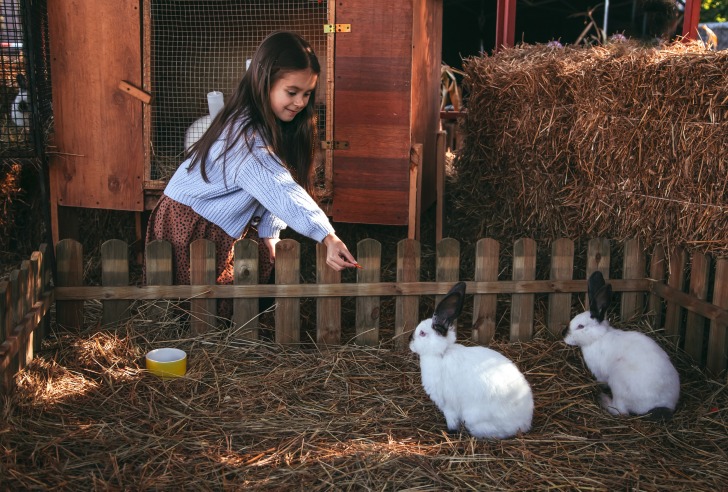Trips to the zoo or aquarium are special events and lasting memories for children that are cherished during and after the visit.
Whether the zoo was local or traveling hours by plane, these animal sanctuaries are magical destinations full of fun and intrigue, and Kansas is no exception to this rule.
The best zoos and aquariums in Kansas deliver endless opportunities to view and experience exotic animals from across the globe.
Zoos and aquariums are excellent locations for an exciting and educational experience.
Many zoos have improved their offering to visitors with interactive activities and unique opportunities to get up close and personal with their favorite animals.
Keep reading to learn more about the best zoos and aquariums in Kansas and all they have to offer!
Contents
11 Best Zoos & Aquariums in Kansas
Across Kansas, you can find many zoos and other exciting animal sanctuaries open to the public.
While Kansas doesn’t have many aquariums, many zoos also have aquatic life exhibits, and those few exclusively aquariums are worth a visit!
These are some of the best zoos and aquariums in Kansas.
Eleven: Prairie Park Nature Center
Although a nature center, Prairie park displays more animal species than other locations that consider themselves zoos.
The display hall has a variety of small mammals, fish, amphibians, reptiles, insects, birds, and plants.
Instead of live species, displays are supplemented by stuffed animal dioramas.
While this isn’t a traditional zoo where you can touch and interact with many of the animals, it is an excellent opportunity to learn more about local fish and animals and how they interact with the immediate environment.
Some visitors are lucky enough to catch a glimpse of a mammal or wild bird that ventures up to the center’s windows.
Ten: Eagle Valley Raptor Center
Started in 2003 to promote birds of prey conservation, the Eagle Valley Raptor Center is a sanctuary to care for and treat raptors.
The center is a great resource for visitors to learn more about raptors and why they are essential to the environment.
The raptor property comprises 10 acres with an additional 10 acres of small wetlands, tall grass prairie, and a nature trail.
Visitors must make an appointment to gain access to this park and a $5 donation is suggested, which includes a personalized, guided tour.
The Eagle Valley Raptor Center is an informative, enjoyable, and inexpensive day trip for those with children!
Nine: Lee Richardson Zoo
With over 300 exotic and native animals across 50 acres of property, the Lee Richardson Zoo is a free adventure for pedestrians.
Also, visitors can pay to drive through the park and view various wild animals, like being on an African safari.
All animals are ambassadors for promoting the conservation and understanding of wild places and wildlife.
Some of the most popular animals at the zoo include bears, sloth, jaguars, giraffes, elk, bobcats, ferrets, bison, camels, Amur leopards, addax, alpacas, lions, and many more!
Eight: Safari Zoological Park
Situated just east of Caney, close to the Oklahoma state line, the private Safari Zoological Park has various tropical birds, foxes, wolves, bears, several species of large cats, and primates.
Visitors will find that the hours can be irregular and could close during inclement weather to protect the animals and staff, but once open, the park never stops fantastic guests.
It’s always best to call or look online for closures and to get the most updated hours.
This zoo is a bit different in that a guide walks visitors through the park for approximately one hour, with information about each animal.
Seven: Tanganyika Wildlife Park
Opened in June 2008 as a zoo, Tanganyika is a non-profit organization focused on breeding endangered and rare species, including zebras, snow leopards, tigers, and giraffes.
This park differentiates from traditional zoos by emphasizing engagement between the animals and guests.
That means visitors are privy to multiple opportunities to pet or feed animals like snakes, birds, camels, and lemurs.
Since endangered species are the primary focus, visitors get a completely different experience and education than a traditional zoo or nature center.
The park is only open to the public from April through October.
Six: Great Bend Brit Spaugh Zoo
For a free zoo that’s open daily, the Great Bend Brit Spaugh Zoo offers an impressive collection of animals, large and small.
In addition to viewing the animals, the zoo provides a variety of educational opportunities and special events for those who are looking for more activities than simply walking around the property.
One of the highlights of the Great Bend Zoo is the raptor rehabilitation program, which offers the care of and treatment for animals that will eventually be released back into the wild.
This program has specially-trained staff that rehabilitated injured raptors through physical therapy so they can thrive in the wild.
Five: Hutchinson Zoo
The Hutchinson Zoo in the town of the same name offers extensive interactions with the zoo animals, including a petting zoo for the kids.
In addition to the viewing and petting opportunities, the zoo boasts a comprehensive educational program to further children’s and adults’ knowledge of local and exotic animals while providing enough entertainment for a nice day at the zoo.
With animals ranging from the small black-footed ferret to the large bison and every animal in between, kids will have endless fun at the Hutchinson Zoo.
Four: David Traylor Zoo
Also called the Emporia Zoo because of its location in the town with the same name, the David Traylor Zoo is free to enter but accepts donations upon entry to keep the zoo in operation.
Visitors can look forward to plenty of fun at this zoo, with the lemurs always stealing the show and hearts!
One of the most interesting activities to observe is the lemur’s paw painting on whiteboards! In addition to this unique activity, the David Traylor Zoo is one of the tiniest accredited zoos in the United States with only 400 animals representing around 80 species in natural environments.
The zoo’s walk-through portion allows visitors to see endangered and native species.
At the same time, the section of the botanical gardens boasts interesting plants from around the world and festive holiday lights.
Three: SEA Life Kansas City
Located in Kansas City, the SEA Life aquarium offers insight into many animals, including turtles, seahorses, jellies, stingrays, and sharks, to name a few.
Some of the most popular exhibits include the Sea Turtle Rescue Center, Doodle Reef, the Tropical Ocean Exhibit, the Stingray Bay Exhibit, and the Interactive Touch pool.
SEA Life is a registered charity that protects the world’s oceans and marine life.
As an aquarium chain with locations across the U.S., Sea Life Trust is able to reach a massive audience for participation in their conservation campaigns and to help fund various educational programs and projects including Marine Protected Areas, sustainable fishing, and plastic-free oceans.
Two: Rolling Hills Zoo
The Rolling Hills Zoo allows visitors to get face-to-face with animals you’re unlikely to encounter in the wild, like a majestic snow leopard, an ornery aardvark, a curious chimp, or a rare white rhino.
These animals are just a tiny taste of the over 100 species that call the Rolling Hills Zoo home.
Accredited by the Association of Zoos and Aquariums to ensure the highest standards of animal care are followed, this zoo is dedicated to educating the next generation of visitors and wildlife conservation.
As a bonus, the property features a Wildlife Museum that allows you to view habitats and animals from the Far East, Middle East, North America, rainforests worldwide, the Arctic Tundra, and the African Plains.
One: Sunset Zoo
Located in Manhattan, Kansas, the Sunset Zoo is considered one of the tops in the state because of the endless activities and events the zoo offers.
Open seven days per week throughout the year, the Sunset Zoo boasts an extensive educational program that allows behind-the-scenes access with animal caretakers and trainers, as well as the animals, scientific information about the resident animals, virtual birthday parties and close encounters with different species, and a school safari camp.
Other kid-focused activities include overnight safaris, field trips, and guerilla geography.
Additionally, the zoo is highly focused on animal and plant conservation by offering educational classes taught to children.
11 Best Zoos & Aquariums in Kansas – Summary Table
| Zoos & Aquariums | Address |
|---|---|
| Prairie Park Nature Center | 2730 Harper St, Lawrence, KS 66046, USA |
| Eagle Valley Raptor Center | 927 N 343rd St W, Cheney, KS 67025, USA |
| Lee Richardson Zoo | 312 E Finnup Dr, Garden City, KS 67846, USA |
| Safari Zoological Park | 1751 A County Rd 1425, Caney, KS 67333, United States |
| Tanganyika Wildlife Park | 1000 S Hawkins Ln, Goddard, KS 67052, United States |
| Great Bend Brit Spaugh Zoo | 2123 Main St, Great Bend, KS 67530, USA |
| Hutchinson Zoo | 6 Emerson Loop, Hutchinson, KS 67501, USA |
| David Traylor Zoo | 75 Soden Road, Emporia, KS 66801, USA |
| SEA Life Kansas City | 2475 Grand Blvd, Kansas City, MO 64108, USA |
| Rolling Hills Zoo | 625 N Hedville Rd, Salina, KS 67401, United States |
| Sunset Zoo | 2333 Oak St, Manhattan, KS 66502, USA |
Kansas Safety Overview
READ THE FULL REPORT: Kansas Safety Review
Safety Index:
- OVERALL RISK: LOW
- TRANSPORT & TAXIS RISK: MEDIUM
- PICKPOCKETS RISK: LOW
- NATURAL DISASTERS RISK: MEDIUM
- MUGGING RISK: LOW
- TERRORISM RISK: LOW
- SCAMS RISK: LOW
- WOMEN TRAVELERS RISK: LOW
Frequently Asked Questions
What is the biggest zoo in Kansas?
The Sedgwick County Zoo is the largest in the state and one of the largest in the U.S. Featuring over 2,500 animals representing around 500 species, this zoo is also one of the state’s largest attractions.
The most popular exhibit is the Downing Gorilla Forest.
Where does the free Great Bend Zoo get its funding?
The Great Bend Zoo is a city-owned and operated institution that receives an annual budget to care for the animals and property and pay employees.
The Great Bend Zoological Society covers many funds lacking in the budget, like new exhibits and enrichment items, so multiple parties fund the zoo to ensure animals receive the care required.
Is the Kansas City Zoo large?
Compared to the other zoos in the state, except the Sedgwick County Zoo, the Kansas City Zoo is considered significant, with over 1,700 animals from all seven continents situated in a natural setting.
This zoo sits on 202 acres of land in Swope Park.
How many zoos does Kansas have?
The state boasts 13 named zoos and countless animal parks like nature centers and care facilities that are open to the public.
Wherever you are in Kansas, you likely aren’t far from some type of animal attraction.











